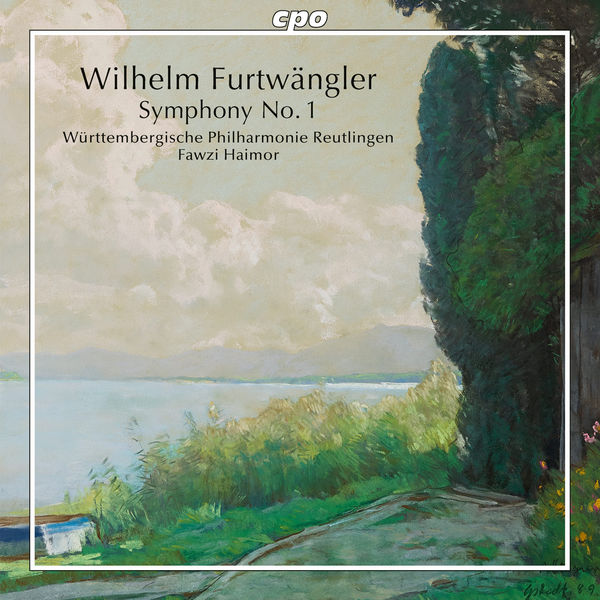
Unlimited Streaming
Listen to this album in high quality now on our apps
Start my trial period and start listening to this albumEnjoy this album on Qobuz apps with your subscription
SubscribeEnjoy this album on Qobuz apps with your subscription
Digital Download
Purchase and download this album in a wide variety of formats depending on your needs.
Wilhelm Furtwängler was an avid composer even as a boy. His natural talent developed continuously until he had reached early adulthood. His compositions from these early years included symphonic works and an impressive Te Deum, but the promise they contained was not fulfilled: while Furtwängler quickly was able to obtain increasing success as a conductor, his creative juices ceased to flow for almost a quarter of a century. It was first after his open conflict with the new German regime (in the “Hindemith Affair”), causing him to resign from all his official posts, that his compositional energies once again streamed forth. The yield from the last twenty years of his life, when he apparently was in search of lost times past, included two Violin Sonatas, a Piano Quintet, a Piano Concerto, and three monumental symphonies.
And the search was successful: already the Symphony No. 1 in B minor composed between 1938 and 1941 releases with elemental force the energies formerly held back and sends them flowing into architectures of Brucknerian dimensions without the composer ever slavishly following the precedents set by the Austrian master. With this work Wilhelm Furtwängler, standing firmly on Late Romantic tonal ground, thoroughly acquainted with the resources of the philharmonic orchestra, slow and deliberate in his composing, introduced a triptych that can be understood as a memorial to a bygone era and at the same time is to be heard as a hopeful signal. © CPO
You are currently listening to samples.
Listen to over 100 million songs with an unlimited streaming plan.
Listen to this playlist and more than 100 million songs with our unlimited streaming plans.
From £10.83/month

Symphony No. 1 in B minor (Wilhelm Furtwängler)
Wurttembergische Philharmonie - Fawzi Haimor, Conductor - Wilhelm Furtwängler, Composer
© 2021 CPO ℗ 2021 CPO
Wurttembergische Philharmonie - Fawzi Haimor, Conductor - Wilhelm Furtwängler, Composer
© 2021 CPO ℗ 2021 CPO
DISC 2
Wurttembergische Philharmonie - Fawzi Haimor, Conductor - Wilhelm Furtwängler, Composer
© 2021 CPO ℗ 2021 CPO
Wurttembergische Philharmonie - Fawzi Haimor, Conductor - Wilhelm Furtwängler, Composer
© 2021 CPO ℗ 2021 CPO
Album review
Wilhelm Furtwängler was an avid composer even as a boy. His natural talent developed continuously until he had reached early adulthood. His compositions from these early years included symphonic works and an impressive Te Deum, but the promise they contained was not fulfilled: while Furtwängler quickly was able to obtain increasing success as a conductor, his creative juices ceased to flow for almost a quarter of a century. It was first after his open conflict with the new German regime (in the “Hindemith Affair”), causing him to resign from all his official posts, that his compositional energies once again streamed forth. The yield from the last twenty years of his life, when he apparently was in search of lost times past, included two Violin Sonatas, a Piano Quintet, a Piano Concerto, and three monumental symphonies.
And the search was successful: already the Symphony No. 1 in B minor composed between 1938 and 1941 releases with elemental force the energies formerly held back and sends them flowing into architectures of Brucknerian dimensions without the composer ever slavishly following the precedents set by the Austrian master. With this work Wilhelm Furtwängler, standing firmly on Late Romantic tonal ground, thoroughly acquainted with the resources of the philharmonic orchestra, slow and deliberate in his composing, introduced a triptych that can be understood as a memorial to a bygone era and at the same time is to be heard as a hopeful signal. © CPO
About the album
- 2 disc(s) - 4 track(s)
- Total length: 01:28:09
- 1 Digital booklet
- Main artists: Württembergische Philharmonie Reutlingen Fawzi Haimor
- Composer: Wilhelm Furtwängler
- Label: CPO
- Area: Allemagne
- Genre: Classical Symphonic Music Symphonies
- Period: Modern Style
© 2021 CPO ℗ 2021 CPO
Improve album information
 Why buy on Qobuz...
Why buy on Qobuz...
-
Stream or download your music
Buy an album or an individual track. Or listen to our entire catalogue with our high-quality unlimited streaming subscriptions.
-
Zero DRM
The downloaded files belong to you, without any usage limit. You can download them as many times as you like.
-
Choose the format best suited for you
Download your purchases in a wide variety of formats (FLAC, ALAC, WAV, AIFF...) depending on your needs.
-
Listen to your purchases on our apps
Download the Qobuz apps for smartphones, tablets and computers, and listen to your purchases wherever you go.



